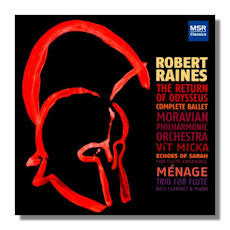
The Internet's Premier Classical Music Source
Related Links
- Latest Reviews
- More Reviews
-
By Composer
-
Collections
DVD & Blu-ray
Books
Concert Reviews
Articles/Interviews
Software
Audio
Search Amazon
Recommended Links
Site News
 CD Review
CD Review
Robert Raines

Orchestral Music
- Echoes of Sarah 1 (2007)
- Ménage 2 (2005)
- The Return of Odysseus 3 (2007)
2 Deanna Bertsche, flute
2 Erin Douglass, bass clarinet
2 Jose Bevia, piano
1 Florida State University Flute Ensemble/Matt Thomas
3 Moravian Philharmonic Orchestra/Vit Micka
MSR Classics MS1299 51:29
Summary for the Busy Executive: 52nd Street and the blood of Greece.
The jewel-case booklet cover – a graphic Greek helmet in bold red brushstrokes – attracted me. It turns out that it came from composer Robert Raines, who also has a substantial career as a painter and commercial artist. Raines has also performed as a professional musician, classical and jazz. I find the compositions here (the only ones by him I know) variable. All are well-written. I don't think we're talking about the next Stravinsky here, exactly, but they do reveal an individual voice.
Because I'm shallow, I generally prefer fast music to slow. Echoes of Sarah, for nine flutes, memorializes a friend who died of a rare blood disease. I can't call it a success. The flute ensemble produces a fairly homogeneous sound – a kind of sonic glob – and Raines creates little variety at a crawl. For me, the piece plods throughout its 11 minutes.
Ménage consists of three movements, each about three minutes long, for three instruments: flute, bass clarinet, and piano. They're short, but meaty. The first movement seems to come out of jazz, but it's not the standard composer go-to of Twenties jazz, rather something more like hard bop and Bud Powell. The air of an elegy hangs over the second movement, far more expressive than Echoes of Sarah. The third dances to a Bernsteinian jazz pulse. The music comes across as American Midcentury Modern, with a lot of verve.
The big work, The Return of Odysseus, began as Raines's dissertation for his doctorate in composition at Florida State. In three acts, the music seems a blended mix of previous American ballet scores – Schuman's Judith, Carter's Minotaur, Barber's Cave of the Heart, and perhaps Harbison's Ulysses – but it's a thorough blend. Usually, American ballets on classical or Biblical myth view the action through a psychological lens. Raines approaches the story of Odysseus's homecoming pictorially. Act I introduces the goddess Athena, who reminds us of her protective presence over Odysseus and his house. We move on to the suitors with "barbaric" music, full of Stravinskian ostinatos. Act II shows us Odysseus in three of his adventures: the Cyclops, the sirens, and the descent into Hades. We get the Cyclops in, predictably, lumbering music. The sirens sing strangely, to alluring colors in the orchestral, but with a diseased, dangerous undercurrent. "The Kingdom of the Dead" begins in grim procession, with some evocative percussion writing and howls in the winds and brass. As the piece proceeds, the tempo picks up. Act III depicts the hero's return to Ithaca, his slaying of the suitors with the great bow (orchestral phwwts marking the arrows' flying to their targets) and his return to the marriage bed. The finale winds things down in a Coplandesque way. I like best the score's gritty view of ancient Greece. This isn't storybook stuff – noir, rather than Disney.
The performers are fine. The Florida State University Flute Ensemble, saddled with the one weak piece, makes little impression, but I can't blame them. The piano trio gives a reading full of rhythmic vim, and the Moravian Philharmonic has electrifying moments in the ballet.
Copyright © 2011, Steve Schwartz.




















